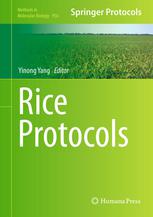

Most ebook files are in PDF format, so you can easily read them using various software such as Foxit Reader or directly on the Google Chrome browser.
Some ebook files are released by publishers in other formats such as .awz, .mobi, .epub, .fb2, etc. You may need to install specific software to read these formats on mobile/PC, such as Calibre.
Please read the tutorial at this link: https://ebookbell.com/faq
We offer FREE conversion to the popular formats you request; however, this may take some time. Therefore, right after payment, please email us, and we will try to provide the service as quickly as possible.
For some exceptional file formats or broken links (if any), please refrain from opening any disputes. Instead, email us first, and we will try to assist within a maximum of 6 hours.
EbookBell Team

4.1
30 reviewsWith the completion of a finished rice genome sequence, increasing efforts have focused on functional characterization of rice genes, elucidation of the underlying mechanisms involved in major agronomic traits (e.g., high yield, grain quality, abiotic stress tolerance, and disease resistance), and the subsequent translation of genomic knowledge into agricultural productivity via molecular breeding and improved cultural practice. To meet increasing interest in this field, Rice Protocols has been compiled to provide a series of core techniques and approaches commonly used in studying rice molecular biology and functional genomics. These approaches include genetic and molecular techniques such as artificial hybridization, fluorescence in situ hybridization, generation and characterization of chemical and T-DNA insertional mutants, quantitative trait loci (QTLs) analysis and map-based cloning, site-specific transgene integration, and artificial microRNA-mediated gene silencing, along with a variety of “omics” techniques. Written in the highly successful Methods in Molecular Biology™ series format, chapters include introductions to their respective topics, lists of the necessary materials and reagents, step-by-step, readily reproducible laboratory protocols, and tips on troubleshooting and avoiding known pitfalls.
Authoritative and easy to use, Rice Protocols will prove useful for both beginners and experienced researchers whether they are molecular biologists who want to study rice plants or rice researchers who are interested in learning molecular techniques.